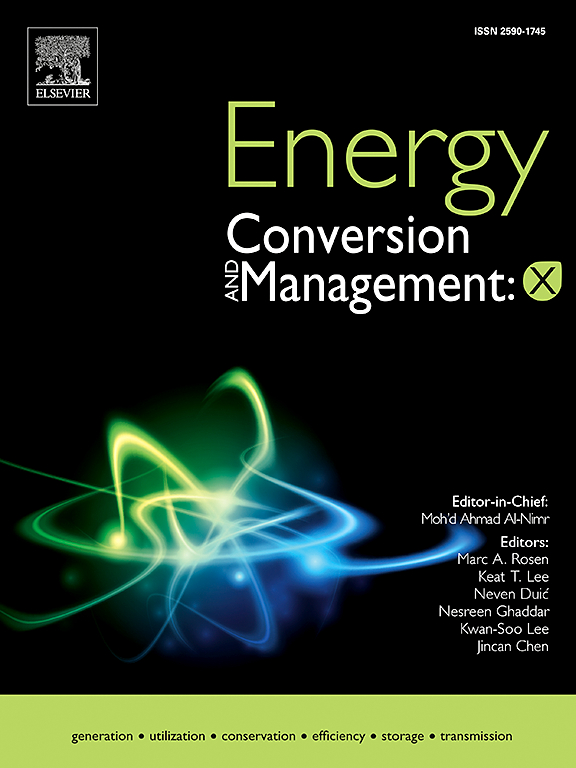SnO2/R141b和Co3O4/R141b纳米制冷剂和MWCNT+SiC/水混合纳米流体对太阳能有机朗肯循环性能的双重增强
IF 7.1
Q1 ENERGY & FUELS
引用次数: 0
摘要
考虑到对可持续能源转换的需求日益增长,先进的热力系统在发电中发挥了至关重要的作用。本研究介绍了通过双级策略增强的小型太阳能有机朗肯循环(SORC)系统的能量和用能分析:在真空管太阳能集热器(ETSC)中使用混合纳米流体(MWCNT + SiC/水),而在ORC回路中使用SnO2/R141b和Co3O4/R141b纳米制冷剂。实验结果表明,混合纳米流体显著改善了ETSC的热性能,在1.0 vol%和3 lpm时热效率最高,达到44.83%。ETSC增加的热量输入有助于提高循环效率。当SnO2/R141b含量为1.0 vol%时,ORC的能量和火用效率分别达到16.76%和6.64%。与Co3O4/R141b相比,SnO2/R141b具有更好的导热性和能量输出质量。因此,本研究对纳米制冷剂在小型SORCs中的应用做出了重大贡献,为下一代可持续、高效的发电技术开辟了新的技术途径。这项工作讨论了与纳米制冷剂应用相关的一些关键差距,并指出了保证清洁能源未来的途径。本文章由计算机程序翻译,如有差异,请以英文原文为准。

Dual enhancement of solar organic Rankine cycle performance using SnO2/R141b and Co3O4/R141b nano-refrigerants and MWCNT+SiC/water hybrid nanofluid
Considering the increasing demand for converting sustainable energy, advanced thermal systems have played a vital role in electricity generation. This study presents energy and exergy analyses of a small-scale solar organic Rankine cycle (SORC) system enhanced through a dual-stage strategy: a hybrid nanofluid (MWCNT + SiC/water) is used in the evacuated tube solar collector (ETSC), while SnO2/R141b and Co3O4/R141b nano-refrigerants are applied in the ORC loop. Experimental results show that the hybrid nanofluid significantly improved the thermal performance of the ETSC, achieving a maximum thermal efficiency of 44.83% at 1.0 vol% and 3 lpm. The enhanced heat input from the ETSC contributed to higher cycle efficiencies. The ORC achieved its highest energy and exergy efficiencies—16.76% and 6.64%, respectively with SnO2/R141b at 1.0 vol%. Compared to Co3O4/R141b, SnO2/R141b exhibited superior thermal conductivity and energy output quality. Therefore, this study makes a major contribution to nano-refrigerants in small-scale SORCs, opening new technological avenues for next-generation sustainable, efficient power generation technology. This work discusses some critical gaps related to nano-refrigerant applications and indicates a pathway toward guaranteeing clean energy futures.
求助全文
通过发布文献求助,成功后即可免费获取论文全文。
去求助
来源期刊

Energy Conversion and Management-X
Multiple-
CiteScore
8.80
自引率
3.20%
发文量
180
审稿时长
58 days
期刊介绍:
Energy Conversion and Management: X is the open access extension of the reputable journal Energy Conversion and Management, serving as a platform for interdisciplinary research on a wide array of critical energy subjects. The journal is dedicated to publishing original contributions and in-depth technical review articles that present groundbreaking research on topics spanning energy generation, utilization, conversion, storage, transmission, conservation, management, and sustainability.
The scope of Energy Conversion and Management: X encompasses various forms of energy, including mechanical, thermal, nuclear, chemical, electromagnetic, magnetic, and electric energy. It addresses all known energy resources, highlighting both conventional sources like fossil fuels and nuclear power, as well as renewable resources such as solar, biomass, hydro, wind, geothermal, and ocean energy.
 求助内容:
求助内容: 应助结果提醒方式:
应助结果提醒方式:


